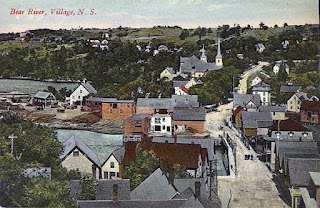Lt. Col. Joseph Hayes, the 85th’s Medical Officer and later chronicler, summarized the band’s contributions to the unit in these words: “Above all, the Silver Band and later, the Pipe Band as well, were sources of ever present entertainment for the Battalion when out of the line.” Hayes rated the band as “unexcelled in the Canadian Corps,” and elaborated on its routine:
“Coming out of the line or back from a ‘Show’ [battle] it was invariably met by them. During the time ‘out’ the days were replete with Band Concerts—if the billets were scattered, they took turns with the different companies. When the Battalion went ‘In’, the Bands accompanied it as far as regulations permitted, and everyone seemed to step a little smarter, and to hold their head a little higher, as the Bands swung into the old familiar Regimental, on parting.”
The band provided nightly entertainment during the 85th’s time in Divisional Reserve. Harry contributed his percussionist talents as kettle drummer, in addition to his “rounded cantabile baritone” voice as vocalist. The group was renowned for its versatility, particularly the musical talents of its soloists—Thomas Roy (euphonium); Percival Barnes (piccolo and flute); Ronald McDougall and Duncan William Cameron (cornet); James Campbell Profit and Alex Myers (clarinet); and Alex McDougall (trombone)—and the trombone quartet of Alex McDougall, John James Gray, Clarence Edgar Purvis and James Roy. The 85th’s Silver Band soon became a 4th Division fixture, entertaining each Brigade’s battalions during their breaks from front-line service.
Harry and a small group of band mates also drew upon their pre-war theatrical talents, forming a “concert party” to entertain their comrades. Harry assumed the “lead” role in the party’s small theatrical productions, sketches and vaudeville routines, with George Edward Rackham of Amherst—a missionary to China during the post-war years—playing his “foil.” Talented step dancers Frank Arthur Ryan (Moncton), Charles William Appleton (Stellarton) and Ronald McDougall (Pictou) also participated, Ryan in particular renowned for his “eccentric dancing specialties.”
In early 1918, spurred on by their initial successes, Harry decided to tackle a much more ambitious project. Calling upon memory and previous experience, Harry wrote out the entire script of “The Old Homestead,” a popular Pictou County production. With the assistance of the “concert party” and band members, Harry directed and produced the show, reputedly the only complete stage production presented to Canadian troops in the forward area.
 |
| "The Old Homestead" Movie Poster (1935) |
According to Hayes’ account, the group first presented the play during the 85th’s second stay at Raimbert, France in late February and early March 1918. Hayes described their efforts as “an unqualified success, and in the next few months the performance was given several times before the Battalion as well as before the other Battalions of the Brigade.” In subsequent months, the troupe presented “The Old Homestead” to units in the British and American sectors.
Similar entertainment troupes were widespread amongst Canadian and British units throughout the forward area in war’s final two years. It has been suggested that the decision to allow the 85th’s silver band to remain intact within its ranks set a precedent soon emulated by other units, whose bands or instruments had remained in England.
 |
| Harry Murray (right), Brussels, Belgium (February 1919) |
“Later during the fighting of the summer and fall, when it was impossible for the Band to accompany the Battalion at all times, they played before several thousand Imperial and Canadian soldiers [behind the lines] at Écoivres and Marenla [France].”
On September 25, Harry was admitted to No. 5 Canadian Field Ambulance on September 25 with tonsillitis and transferred to No. 12 Stationary Hospital for treatment. He returned to duty with the 85th at Agnez-les-Duisans on October 14 and remained with the unit for the duration of the Canadian Corps’ advance toward Mons, Belgium. Following the Armistice, the 85th encamped near the historic city, its soldiers preparing for their return to civilian life.
Having established itself as one of the Canadian Corps’ premier Silver Bands, the group was in constant demand. In Lt.-Col. Hayes’ words, “during the latter days of the [85th’s] stay on the continent, it had attained such a degree of popularity throughout the [4th] Division that, at times, it was almost impossible to keep it with the Battalion at all.”
 |
| 85th Battalion Silver Band, Rixensart, Belgium (1919) |
The 85th broke camp on April 25 and made its way by train to Le Havre, France, disembarking late the following evening. On April 28 and 29, personnel crossed the English Channel to Southampton in two groups and made their way to Bramshott Camp. On the month’s final day, the unit prepared for “the big parade in which 125 O. R.’s, the Silver Band and 16 Officers will take part.” In fact, the 85th’s silver band was one of only two Canadian bands to participate in the Great March of Triumph that wound its way through the streets of London on May 3.
The 85th Battalion departed England aboard the SS Adriatic on May 31and arrived at Halifax “to a tumultuous welcome” on June 10. The following day, the silver band led the battalion on a final march through the city to the Halifax Armouries, where CO Lt.-Col. Ralston issued “final dismissal” orders. After almost four years in uniform, Harry Murray was formally discharged from military service at Halifax on June 15, 1919, and returned home to Stellarton.
 |
| The 85th's Homecoming - Halifax, June 1919 |






























